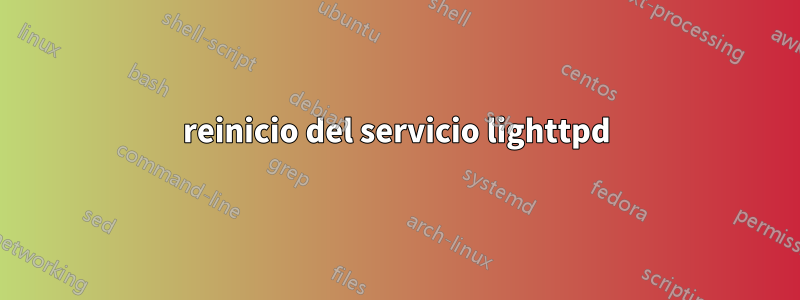
Estoy iniciando un servicio lighttpd en mi ubuntu. Mi idea aquí es servir un script de Python a través de CGI. Pero, cuando hago esto, ¿me prohíben el 403? ¿Ayuda a depurar y qué me falta aquí?
vi /etc/lighttpd/lighttpd.conf
server.document-root "/home/httpd"
Habilitar, CGI en lighttpd.
vi /etc/lighttpd/lighttpd.conf
server.modules = (
"mod_access",
"mod_alias",
"mod_compress",
"mod_redirect",
"mod_cgi",
"mod_rewrite",
)
Para que lighttpd reconozca cualquier script de Python, debemos agregar la siguiente sección nueva al final del archivo.
$HTTP["url"] =~ "^/cgi-bin/" {
cgi.assign = (".py" => "/usr/bin/python")
}
Otorgue el permiso apropiado a la carpeta raíz.
# chown www-data /home/httpd/cgi-bin
# chgrp www-data /home/httpd/cgi-bin
Ahora, escribe hello.py
vi /home/httpd/cgi-bin/hello.py
#! /usr/bin/python
#
print "Content-Type: text/html\n\n"
print '<html> <head> <meta-content="text/html; charset=UTF-8"/>'
print '<title> Raspberry Pi </title>
<p>
for count in range(1,100)
print'Hello World...'
print "/p> <body> </html>
Finally, restart the lighttpd service.
reinicio del servicio lighttpd
But, when I try to access the page it says-
403 forbidden
Aquí está mi carpeta con permiso /home/httpd.
/home/httpd$ ls -l
total 8
drwxr-xr-x 2 www-data www-data 4096 Apr 3 17:56 cgi-bin
drwxr-xr-x 2 www-data root 4096 Apr 3 16:41 html
Aquí está el hola.py
/home/httpd/cgi-bin$ ls -l
total 4
-rwxrwxrwx 1 root www-data 244 Apr 3 17:56 hello.py
¿El registro dice que todavía está buscando archivos php, html en lugar de mi binario de Python?
read(7, "GET / HTTP/1.1\r\nHost: 10.0.2.15\r"..., 4159) = 328
stat("/home/httpd/", {st_mode=S_IFDIR|0755, st_size=4096, ...}) = 0
stat("/home/httpd/index.php", 0x7ffee411b9f0) = -1 ENOENT (No such file or directory)
stat("/home/httpd/index.html", 0x7ffee411b9f0) = -1 ENOENT (No such file or directory)
stat("/home/httpd/index.lighttpd.html", 0x7ffee411b9f0) = -1 ENOENT (No such file or directory)
setsockopt(7, SOL_TCP, TCP_CORK, [1], 4) = 0
writev(7, [{iov_base="HTTP/1.1 403 Forbidden\r\nContent-"..., iov_len=134}, {iov_base="<?xml version=\"1.0\" encoding=\"is"..., iov_len=345}], 2) = 479
setsockopt(7, SOL_TCP, TCP_CORK, [0], 4) = 0
ioctl(7, FIONREAD, [0]) = 0
read(7, 0x5606cf6ceaf0, 4159) = -1 EAGAIN (Resource temporarily unavailable)
epoll_ctl(6, EPOLL_CTL_ADD, 7, {EPOLLIN|EPOLLERR|EPOLLHUP, {u32=7, u64=7}}) = 0
accept4(4, 0x7ffee411bc10, [112], SOCK_CLOEXEC|SOCK_NONBLOCK) = -1 EAGAIN (Resource temporarily unavailable)
Respuesta1
Consulte el registro de errores de lighttpd para ver si hay algún rastro.
Verifique la configuración de SELinux y tal vez deshabilite temporalmente la aplicación para realizar pruebas.
Aquí hay una pregunta anterior que podría estar relacionada: https://serverfault.com/questions/335571/selinux-causes-permission-denied-when-starting-lighttpdfastcgi-via-upstart
Si está interesado en más detalles sangrientos, también puede utilizar straceel proceso lighttpd para ver qué llamada al sistema falla cuando realiza esa solicitud.


